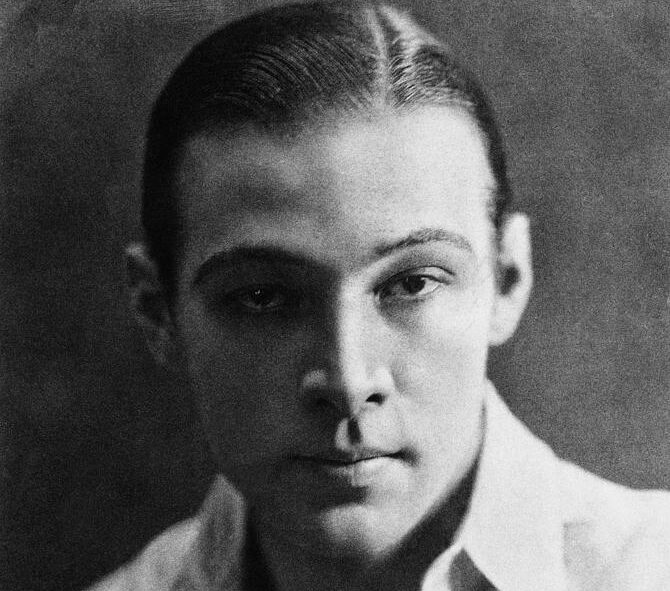Rudolph Valentino’s story is out of the ordinary. He embodies success at its highest, the chance of reaching the top when doing it, everywhere else, is forbidden, unthinkable, a pure utopia. This is the very meaning many migrants gave to the American experience, and not without reason, considering the incredible personal goals many of them achieved. Millions of paesani left with empty pockets and nothing to return to but, on the other side of the ocean, they met, thanks to their hard work, a life unimaginable even just one generation before. They made it despite the difficulties, and their stories created – through the collective word of mouth of those who had remained, who didn’t have the courage or the opportunity to sail across the ocean – the myth of “Merica.” Because, of course, the extraordinary success of just a few is louder than the silent and disillusioned return of many who couldn’t make it, nor could find the simplest, humblest of jobs to stay in the New World.
But Rudy, incredible charmer of the newborn art of cinema, which made him the first, iconic “Latin lover,” tells us also of the deep connection migrants keep with their homeland, their family, and their home. Before during and after becoming a star, he ran away and came back, he returned and left again, he abandoned and found back his Castellaneta many times. He moved just like the waves of the sea, following his desire and need to leave, widen his horizons and give a chance to his dreams. But he also followed his yearning to return, to reconnect, to challenge what he had left behind. To find relatives and ancestral landscapes, to show what he had achieved, but also to keep his family connections alive. Back and forth, in endless alternance, just like depression and excitement, ambition and failure.
Castellaneta and Apulia didn’t treasure him enough. It was a world too far behind back then, at the moment of his triumph, too far from the illusions of Hollywood, too realistic – even today – to claim for itself the all-American myth that Rudolph embodied and still represents. Nobody would have fainted in the street for him, here; no crowds of screaming women would have killed themselves for a seductive actor and dancer with magnetic eyes, as happened in the Summer of 1926 in New York. Simple people couldn’t fall victim to mass hysteria: they may have been attracted by his charm and by the lifestyle he represented, but they had other things to do, they had to put bread on the table, and work in the fields under the August sun.
Castellaneta didn’t seem too interested in him, a myth of silent cinema, because he was different. He was too American, very Parisian, very international, in a time when being cosmopolitan wasn’t fashionable, especially there, in the deep South of Italy, a place of landed estates and analphabetism. He was too wealthy, too “aristocratic;” he could afford all whims and all vices; he was different from the rest if it’s true that he had the opportunity to travel and study, rather than picking olives and digging the earth.
Even today, Castellaneta isn’t claiming her lost child back, even if it could become quite a tourist magnet. Perhaps too much time passed, perhaps that silent but alluring star has faded too much to attract, contrarily to what happens in Hollywood where, every year, Rudolph is remembered in a grandiose commemoration at the Hollywood Forever. There, if you are born in Italy, it’s hard not to feel out of place during the ceremony, unless you pretend to be an extra in some sort of candid video showing a plethora of widows crying under their black veil, while leaving red roses on the grave of an old actor, on the anniversary of his death.
To say it all, the modern Italian inability to claim back charming Rudolph is out of the ordinary, too. We can’t bring him home: the man who walked into the history of world cinema – and women’s imagination – with a step of tango, strengthening the myth of the Latin lover, of the fearless knight in a shiny armor who dies young. Just like it really happened to him, who left this world when he was at the apex of success, of a popularity which, in many ways, has never been matched by anyone.
Similarly, we seem not to recognize the history of our compatriots’ migrations as part of our national identity, of our national growth, even if millions of them left – and keep on leaving – from North and South. Even those who migrate today, and often come back home as winners, are called cervelli in fuga, an expression that highlights their status as migrants, but also the need to bring them back so they can be exploited, not admired and respected as a capital of Italianità and a model to celebrate, regardless to where their talent blossomed.
Rodolfo Valentino è sicuramente un caso atipico. Rappresenta il successo massimo, quella chance di conquista della vetta che altrove è proibita, impensabile, pura utopia. Il significato che molti emigranti diedero, anche a ragione veduta dati gli incredibili risultati personali e i traguardi raggiunti, dell’esperienza americana. Milioni di paesani partirono con nulla in tasca e nulla alle spalle ma al di là dell’oceano trovarono una fortuna inimmaginabile, anche una sola generazione prima, pur se a costo di duro lavoro. Nonostante mille difficoltà ce la fecero e i loro racconti, alle orecchie di chi era rimasto, di chi non aveva avuto il coraggio di lasciarsi tutto dietro o la possibilità di salire su un transatlantico, costruirono nel passaparola collettivo il mito della “Merica”. Perché ovviamente fa più rumore il successo straordinario di pochi che non il ritorno, deluso e sconfortato, di molti che non riuscirono a sfondare e nemmeno a trovare condizioni minime per restare oltreoceano.
Ma Rudy, quell’incredibile seduttore del neonato grande schermo che coniò per lui l’icona del latin lover, racconta anche del profondo legame che l’emigrante conserva con la terra delle origini, con la famiglia, con la casa paterna. Prima, dopo e durante il successo fuggì e rincasò, tornò e ripartì, lasciò e ritrovò più volte la natia Castellaneta. Si mosse come le onde del mare, assecondando sia la voglia e il bisogno di partire, di allargare gli orizzonti e soddisfare le aspirazioni, sia il bisogno di fare ritorno, di riannodare i fili, di confrontarsi con quello che aveva lasciato alle spalle, di ritrovare parenti e panorami ancestrali, di esibire i risultati ma anche di non spezzare i rapporti parentali. Avanti e indietro, come alterne furono la depressione e l’esaltazione, l’ambizione e il fallimento.
Castellaneta, la sua Puglia, non seppe far tesoro del suo gioiello. Troppo indietro allora, al momento del suo trionfo, troppo lontana da quel mondo illusorio di Hollywood, troppo con i piedi per terra anche oggi per appropriarsi di quel mito essenzialmente americano che Rudolph incarnò e ancora rappresenta. Nessuno mai sarebbe svenuto per strada per lui, nessuna folla di donne urlanti si sarebbe mai suicidata per un attore e seducente ballerino dallo sguardo magnetico come accadde nell’estate del 1926 a New York, nessuna isteria di massa poteva sconvolgere gente semplice che certo poteva essere attratta dal suo fascino e dalla bella vita che rappresentava ma che badava pur sempre al pane da mettere in tavola e alla terra da coltivare sotto il sole d’agosto. Non sembrava granchè interessata a quel mito del muto in fondo troppo diverso perché troppo americano, molto parigino, molto internazionale quando non era affatto di moda essere cosmopoliti, soprattutto nel profondo Sud dei latifondi e dell’analfabetismo, troppo benestante e dal fare tanto aristocratico che poteva permettersi capricci e vizi, dai modi così poco popolari se è vero che il divo aveva potuto studiare e viaggiare, anziché raccogliere olive e zappare i campi.
Anche oggi Castellaneta non pare ambire a rivendicarne la paternità, nemmeno sulla scorta di trasformarlo in un attrattore turistico. Forse è passato il tempo, forse quel divo silenzioso ma ammiccante si è sbiadito troppo nel tempo per funzionare come invece accade nella mecca del cinema americano, dove tutti gli anni va in scena una commemorazione in grande stile all’Hollywood Forever, dove se si è nati e cresciuti in Italia si fatica non poco a immedesimarsi nella cerimonia se non immaginandosi comparse improvvisate di una candid camera che riprende pletore di vedove sotto velette nere che piangono e ogni anno depongono rose rosse sulla tomba di un vecchio attore, in occasione dell’anniversario della scomparsa.
Insomma, atipica è anche l’attuale incapacità italiana di riappropriarsi di quell’ammiccante Rudolph che entrò a passo di tango nella storia del cinema mondiale e nell’immaginario femminile, consolidando il mito dell’amante latino, del cavaliere senza macchia e senza paura che muore giovane, come poi tragicamente accadde davvero proprio mentre era all’apice di un successo che, per molti versi, resta insuperato. Analoga incapacità c’è nel riconoscere la storia delle migrazioni dei connazionali come un pezzo dell’identità italiana, come parte del percorso evolutivo nazionale sebbene abbiano coinvolto milioni di persone (e continuino a farlo) da nord a sud. Anche chi parte oggi e che torna spesso vincitore in patria, resta un cervello in fuga (sottolineandone la condizione di emigrante) o un patrimonio da attrarre e convincere a tornare per sfruttarlo, non per ammirarlo come un capitale di italianità, come un modello virtuoso da celebrare a prescindere dal luogo in cui è sbocciato e fiorito.































